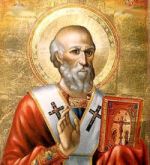The unholy political battle to denounce—or exploit—the Pope's environmental message
By Phil Lawler ( bio - articles - email ) | May 08, 2015
The editorial board of Our Sunday Visitor has a strongly worded statement decrying the premature and vituperative criticism of the papal encyclical on the environment.
“Well before the encyclical’s release,” the OSV board observes, “a veritable campaign against its content has not only been initiated, but has been growing in intensity.” That’s quite true. In fact I made the same observation myself, back in January: “Would it be unreasonable to suggest that we should postpone the discussion of the document until the document appears?”
The OSV statement goes on to complain that some criticism of the papal document has descended into “venom-spewing, ideologically based commentary,” and chides politically conservative Catholics who, in their unseemly haste to dispute the Pope’s teaching, are acting like the “cafeteria Catholics” they so often disdain. Fair enough. There are, unfortunately, many conservative pundits ready to denounce the encyclical—and its author—without making any attempt to discern the Pope’s real message.
Still I hope my friends at OSV would recognize that conservatives are not alone in their pre-emptive arguments about the encyclical. There is indeed a campaign already underway in opposition to the document. But there’s also a campaign to hijack the encyclical, using it as “waving material” for leftist political campaigns without regard to its contents.
Put it this way: If it’s wrong for conservatives to attack the Pope for what they fear he will say, it’s also wrong for liberals to applaud the Pope for what they hope he’ll say. The attacks are more rancorous and offensive than the applause, but neither is respectful of the Pope’s teaching authority.
As this misbegotten debate continues, a nightmare scenario could easily develop. When the encyclical finally does appear, its message may be widely ignored. Conservatives may fire away at what they take to be the political implications of the document, while liberals revel in them. Both sides may be too busy fighting their political proxy wars to pay any attention to the Pope’s moral message, which will be the heart of the encyclical.
Like the other commentators, I have not yet seen the Pope’s encyclical. Yet I can confidently predict that his focus will be not on scientific theories or political programs, but on the moral imperative to act as good stewards of creation. Cardinal Peter Turkson (who presumably does know what the document will say, since he has been working with the Pontiff on the project) has told an Irish audience that political programs to protect the environment “are unlikely to prove effective without moral conversion and a change of heart.” That message could be drowned out, I fear, amidst the din of ideological battle.
It is instructive to notice that although the Vatican has announced the imminent publication of a papal document devoted to the environment, secular media reports almost invariably refer to an “encyclical on climate change”—boiling down the topic to one issue at the top of our political agenda today. Michael Shank, a columnist for Slate, delighted with a recent Vatican conference on climate change, announced that it was “a Sermon on the Mount moment, wherein the beatitudes of a new era were laid down.” There you have a prime example of the liberal tendency to see Church teaching solely in terms of contemporary politics, to assume that the religious doctrines of the past will inevitably be superseded by the political creeds of the present.
“It wasn’t my faith in God that was renewed at the Vatican but rather a faith in our ability to get something done on climate change,” Shank reported. If he honestly believes that Pope Francis will support his way of thinking—that the Pontiff will place faith in human progress above faith in God, or rewrite the Beatitudes to support the environmentalist cause—then the Slate columnist is due for a shock when he reads the encyclical.
IF he reads the encyclical. Because the greatest danger by far, in this battle over a papal document that has not yet seen the light of day, is the likelihood that most people never will read the encyclical. Sadly, they will derive their understanding of the Pope’s writing from partisans who have already shown their determination to ignore his central message.
All comments are moderated. To lighten our editing burden, only current donors are allowed to Sound Off. If you are a current donor, log in to see the comment form; otherwise please support our work, and Sound Off!
-
Posted by: jrorr19609092 -
May. 13, 2015 2:19 AM ET USA
"Al Gore: ‘I could become a Catholic’ because of Pope’s environmental stance" Doesn't that say it all?!
-
Posted by: skall391825 -
May. 13, 2015 1:34 AM ET USA
Francis, you more than once reported, stated that global warming is man-made. Now you criticize us for presuming that his encyclical will say that global warming is man-made.
-
Posted by: wacondaseeds4507 -
May. 11, 2015 12:45 PM ET USA
Business as usual.








